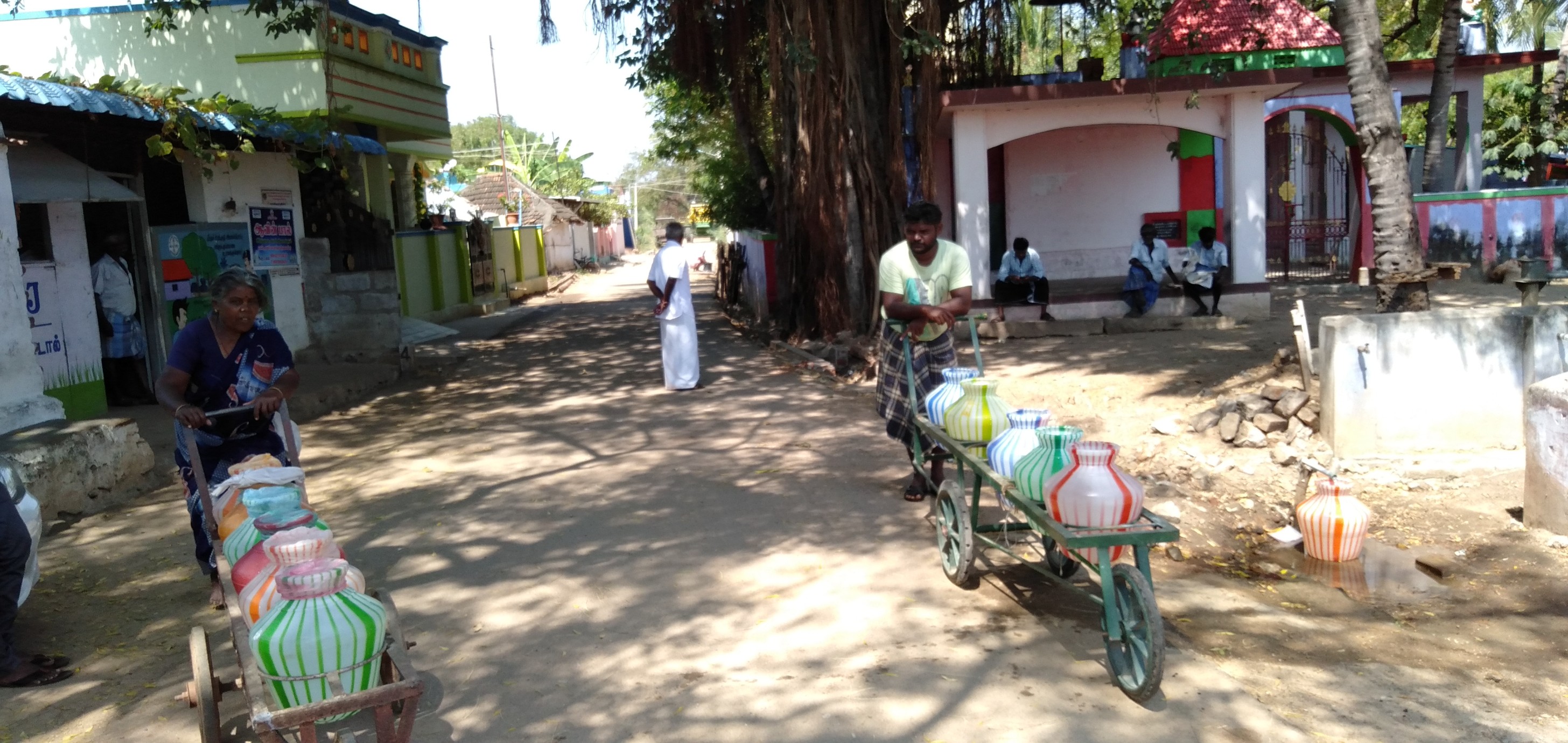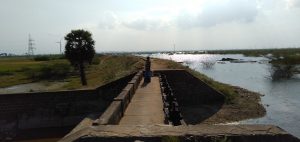
In TN's deep south, marginalised Pallars wooed by BJP stay divided
Tirunelveli, Thoothukkudi and Tenkasi districts are teeming with Pallars. With an eye on the upcoming Assembly election, the Central government had moved a Bill in Parliament recommending bringing all seven sub-castes of Pallars under one name –DKV. But will this move to give in to a demand of the Pallars by the BJP and AIADMK alliance backfire in the Assembly elections?

Puthiamputhur, a village in the Ottapidaram constituency in southern Tamil Nadu, is often referred to by the locals as a ‘town for readymade dresses.’ Located in Thoothukudi district, the village residents here seem to be always eager to embrace new fashions. But their mindset is steeped in caste and its divisive structures.
Near a Siva temple, Ramar, 63, lives in a house, which has a black 4ft high and 8ft wide iron grill gate covered with tarpaulin sheets. Ostensibly, this protective cover is to stop Mudaliar caste boys from pelting stones at them. They also don’t step out of their homes for fear of being attacked by these boys.
Born in a Pallar family, Ramar worked in the Thoothukkudi harbour in an ordinary blue collar job. He has two daughters and two sons, who are all well-educated, and are in good jobs. Before shifting to Puthiamputhur, he lived in neighbouring Naduvakurichi, a SC colony.
“No one dared to speak or act against the people in the colony. We felt safe, but after my retirement, with my hard-earned money I bought land from a Mudaliar and decided to construct a house,” Ramar said.
That was when his problems began. “When I wrote to the local officials to send surveyors to measure the area nobody turned up. I have written to them thrice but no one has come so far. Then I realised, it is the work of the caste Hindus,” said Ramar dejectedly.
Ramar is the only Pallar living in an area largely populated by Mudaliars. It is a hostile atmosphere and he and his family live in constant fear of being attacked. People like him are unable to control even a child from the other caste cheekily calling him names. They throw stones and bricks into their house at nights.
“They do all this because we are Pallars and we belong to a lower caste. So, when they knew that I was going to build a pucca house, the Mudaliars went to the officials and stopped them from doing their job by bribing them,” claimed Ramar, who was made to run from pillar-to-post despite having proper land deeds.
Also read: Congress releases list of 21 candidates for Tamil Nadu polls
“When we questioned them, we were threatened of dire consequences by the police and advocates,” added Ramar. However, after his sons took up his case with a Madurai-based human rights organisation, ‘Evidence’, Ramar was able to complete the construction of his dream house and even had a house warming ceremony in May 2019.
Ramar is convinced that all his problems stemmed from being a Pallar. “There is no other reason why I am being isolated and targeted. We toiled, we earned and we grew. Why does it disturb others? he asked. And, added that he is doubtful whether his caste’s new moniker – Devendra Kula Vellalar (DKV) will help him to be treated equally.
‘Class’ divide on changing the name of a caste
Tirunelveli, Thoothukkudi and Tenkasi districts are teeming with Pallars. With an eye on the upcoming Assembly election, the Central government had moved a Bill in Parliament recommending bringing all seven sub-castes of Pallars under one name –DKV.
But will this move to give in to a demand of the Pallars by the BJP and AIADMK alliance backfire in the Assembly elections? After all the Pallars already share a bitter past marked by feuds with Thevars, while some of the sub-castes of Pallars are against the new nomenclature. Besides, other castes which have ‘Vellalar’ as a suffix are also riled up about giving Pallars a new avatar.
Raj, a tea shop owner in Kodiyankulam, however, disagreed that it will have any impact on the outcome. Stating that 90 % of Pallars are against the title change, he said, “Just a small number of people among the seven sub-castes want this. This may give Dr Krishnasamy, founder-president of Puthiya Tamilagam Katchi, one-third of the Pallar votes, but that will not help him to win. Except in Kodiyankulam, he lacks influence in any other part of the state,” he said.
However, Dr Krishnasamy has been elected from the Ottapidaram constituency twice. Once in 1996, when he fought as an independent and in the 2011 elections after he teamed up with the AIADMK.
Amalraj, who works in the insurance sector, however, felt that DKV will help to restore the lost dignity of the Pallars. According to him, in the past, they were known as Devendrakulathan in land documents but were later converted into untouchables.
Also read: Dhinakaran-Owaisi pact will harm the fortunes of other parties in Tamil Nadu polls
“In villages, we are called as Kudumban (one of the sub-caste of Pallars) and it is only when we come out of the villages, we are known as Pallars. We consider this word as a derogatory one. So, we had demanded the name to be changed,” said Amalraj, adding that Pallars, however, should not be removed from the Scheduled Caste (SC) category.
While some want the new label, others like farmers are clearly indifferent. The farmers are unconcerned about being removed from the SC category as well, but the urban lot is rooting for change. There are contrary views however on whether they should be clubbed under the SC category or not or even be brought under the Most Backward Class category.
“It is only employees working in Group IV, VAOs who are well-settled, who want to exit the SC category,” said Amalraj.
There are only two choices before the Pallars, said Sureshkumar, a salesman. Either to toil in the agricultural lands or get employed in government jobs through reservation.
“In 1936, during the Kamaraj period, Shanars were renamed as Nadars and they were pushed up from being SC to BC. At the same time, we were pulled down from BC to SC. This historic wrong can be corrected now by acknowledging us as a separate category and give us reservation,” he said. This announcement will benefit the AIADMK, added Sureshkumar.
Agreeing with Sureshkumar, Chandran, a social worker said that the BJP’s move to appoint office bearers from SC communities as district secretary and in other important posts, has gone down well with educated and politically-aware youngsters.
Also read: Tamil Nadu’s interim budget: Big promises, unwanted projects
“When both Dravidian parties, other regional and national parties fail to give any responsibilities to the SC functionaries in the party, it is the BJP that works differently here. The first-generation graduates and employees are reluctant to step out of the SC category, he added.
Anandappan, a former panchayat president of Kodiankulam village believed that Krishnasamy and his party had other major concerns to address rather than name alterations. “The issue of drinking water supply to each household is a perennial problem. This promise is made in every election. The government has given the supply of borewell water to the houses, which is saline and useless. But for drinking water, we have to rely on street tap water. Half our lifetime has gone by filling water in pots and taking them to our houses in water carts,” he said.
When DKVs were looked down
But Krishnasamy alone is not the reason for the region’s water problem. Chief Minister Edappadi K Palaniswami’s huge claim of spending crores of rupees to carry the Kudimaramathu scheme did not reach villages like Keelakottai, which has a special place in Tamil Nadu’s economic history.

“The Village Survey Monographs were prepared as a part of the census exercise of 1961, with the objective of seeing how far the developmental programmes adopted in the post-independence India had reached its interior villages. Keelakottai in the then Tirunelveli district chosen for this purpose was one of the forty villages in Tamil Nadu, on which a monograph was later published as the twenty-first series of the Madras Government in 1965,” writes KA Manikumar, former professor of History, Manonmaniam Sundaranar University, Tirunelveli in the book Southern Tamil Nadu Through the Ages published in 2011.
After 40 years of the survey, Manikumar and his team had revisited the village in 2001 and published a paper titled A Dalit Village Revisited: Transformation from 1961 to 2001.
“There is an adage in Tamil that one can count the varieties of nellu (paddy), but cannot count the varieties of Pallu (Pallar caste). However, in Keelakottai there were two sub-castes of Pallars who dominated the village namely, Veeranattu Pallar and Devendrakula Pallar. The former was more progressive in the sense that when the village survey was carried in 1961, one of the researchers came from that area. They were educated and had homes,” said Manikumar to The Federal. Whereas the Devendrakula Pallars, always engaged in agriculture had houses that looked like colonies, he added.
Also read: DMK’s Stalin outlines ‘Mission 200’ for 2021 Tamil Nadu elections
Not much has changed even after 20 years. The dwellings of Devendrakula Pallars in Keelakottai are in a dilapidated condition as compared to the homes of Veeranattu Pallars in Kailasapuram. It is here Manikumar makes an interesting point.
According to the writer, in the current context of politicisation and increasing solidarity among the various sub-groups of Pallars, the Veeranattu Pallars do not openly express their superiority anymore. They are now even open to marriage alliances with the Devendrakula Pallars.
The central theme of Krishnasamy’s politics starts here. He was the one to rake up the issue that Pallars were kept in the lower strata of the society because they were agricultural labourers. For the sake of getting the ‘DKV’ tag, Krishnasamy, of late, said that since they are agriculturists, they should not be equated with Paraiyars and Arunthathiyars. He even changed his movement’s name from Devendra Kula Vellalar Federation, which he had founded in 1990s to Puthiya Tamilagam in 1998. He did all this to make it identifiable as a political party.
The 1961 village report also recorded a tank called Parakrama Pandian Kulam (Kulam, Tamil for pond), which is believed to be built in 1169, following the death of Parakrama Pandian, a Pandya King. Manikumar, during his research in 2001, had observed that some important measures should be taken immediately to maintain the pond, which irrigates nearly 1,500 acres –such as strengthening the bund, removing the thorny bushes, etc.
“A proposal prepared in the year 1998 at an estimated cost of ₹1 lakh is gathering dust,” he noted. It was in the same period Krishnasamy was elected to the Assembly and farmers in the constituency felt that he could have undertaken the project and completed it.


